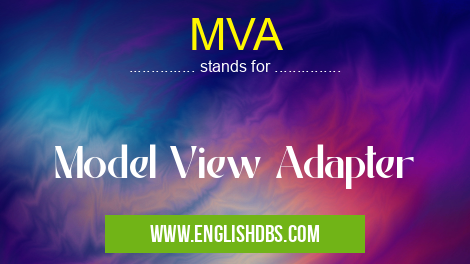What does MVA mean in UNCLASSIFIED
MVA is an acronym that stands for Model View Adapter, a design pattern used in software development. It separates the data representation (model) from the presentation (view) and the logic that connects them (adapter).

MVA meaning in Unclassified in Miscellaneous
MVA mostly used in an acronym Unclassified in Category Miscellaneous that means Model View Adapter
Shorthand: MVA,
Full Form: Model View Adapter
For more information of "Model View Adapter", see the section below.
Understanding MVA
- Model: Represents the underlying data or business logic, encapsulating the data and its operations.
- View: Responsible for displaying the data to the user, providing a user interface or rendering.
- Adapter: Acts as an intermediary between the model and view, adapting the model data into a format suitable for display.
Benefits of MVA
- Decoupling: Separates concerns and allows for independent modifications to the model, view, or adapter without affecting the others.
- Flexibility: Enables easy changes to the user interface or data presentation without altering the underlying data structure.
- Reusability: The adapter can be reused across multiple views, reducing code duplication.
- Testability: Facilitates unit testing of model and view components separately, ensuring maintainability.
Essential Questions and Answers on Model View Adapter in "MISCELLANEOUS»UNFILED"
What is an MVA (Model View Adapter)?
An MVA is a design pattern that separates the data model from the presentation logic and the user interface. It consists of three distinct components: the model, the view, and the adapter. The model holds the data, the view displays the data, and the adapter bridges the gap between the model and the view, ensuring that the view can access and display the model's data.
What are the benefits of using an MVA?
Using an MVA offers several benefits, including:
- Decoupling of data from presentation logic, making it easier to maintain and update the application.
- Reusability of UI components, as the view can be reused with different data models.
- Flexibility in changing the presentation logic without affecting the data model.
- Testability, as the individual components can be tested separately.
When should I use an MVA?
An MVA is suitable when:
- The data model is complex and needs to be presented in multiple ways.
- The presentation logic is complex and needs to be easily changed or updated.
- The application needs to display data from multiple sources in a consistent manner.
How is an MVA implemented?
The implementation of an MVA varies depending on the programming language and framework used. However, the general approach involves:
- Defining the data model.
- Creating a view that interacts with the user.
- Implementing an adapter that connects the view to the data model.
- Binding the adapter to the view so that it can access the data model.
What are some real-world examples of MVAs?
MVAs are widely used in various applications, including:
- Data grids that display tabular data.
- List views that display a list of items.
- Tree views that display hierarchical data.
- Charts and graphs that visualize data.
Final Words: MVA is a valuable design pattern that promotes modularity, flexibility, and testability in software development. By separating the model, view, and adapter, it allows for efficient management of data representation, presentation, and the logic connecting them, making it a popular choice for building maintainable and adaptable applications.
MVA also stands for: |
|
| All stands for MVA |
